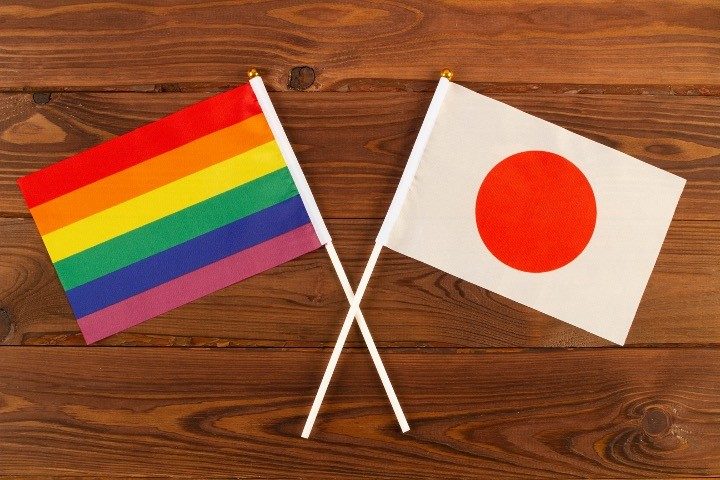
On Tuesday, Nov. 1, the Japanese capital of Tokyo began issuing partnership certificates to same-sex couples who live and work in the capital. The certificates regard LGBTQ+ partners as married couples for various public services in areas like housing, medicine, and welfare.
Since Tokyo’s Shibuya district kickstarted efforts to acknowledge same-sex partnerships in 2015, more than 200 smaller local authorities in Japan have made moves do so.
Pro-LGBTQ+ people welcomed the change, heralding it as progress in the field of homosexual relationships.
“My biggest fear has been that we would be treated as strangers in an emergency,” Miki told Agence France-Presse (AFP) at her home in Tokyo, where photos of the Japanese 36-year-old with her American girlfriend, Katie, 31, are on the fridge.
Without a partnership certificate, the couple, who wished to be referred to by their first names only, used to slip notes inside their wallets with the other’s contact details. “But these were insubstantial, and we felt official documents certified by the local government would be more effective,” Miki added, as her gray-and-white cat frolicked in a rainbow necktie.
At least 137 couples have applied for the certificates. Many people are hoping that these certificates, which cover both residents and commuters, could reduce the stigmas associated with being homosexual in Japan.
“Through this Tokyo partnership system, I sincerely hope we can accelerate efforts to create a society where the rights of sexual minorities can be protected, and made more equal,” campaigner Soyoka Yamamoto told reporters. Yamamoto and her partner, Yoriko, who have lived together for more than a decade, received their certificate on Tuesday morning, with Yoriko calling the move a “huge step forward.”
Several people convened to cheer the news and take photos in front of the towering Tokyo Metropolitan Government building, which was lit up in rainbow colors after sundown. “It’s like Tokyo is cheering us on,” 39-year-old Masato told AFP, while his partner, Chris, said he saw a “bright future” ahead of the couple.
While the change has been widely lauded by LGBTQ+ activists, many highlight that this latest move is not the end of leftist efforts to normalize same-sex unions in Japanese society. “Same-sex marriage is something completely different. That should still be legalized,” said Setsuko Yuragi, 22, who requested to be referred to by her stage name.
Recent years have seen Japan — run by a conservative ruling party that espouses traditional family values — take tiny steps toward favoring alternative unions. More firms are now voicing their support for same-sex “marriage,” and gay characters are more blatantly and openly featured in TV shows.
A 2021 survey by public broadcaster NHK showed 57 percent of the public was in favor of gay “marriage,” versus 37 percent against.
However, conservative segments of Japanese society have retaliated, with a court in Osaka ruling in June this year that it was not unconstitutional for Japan to not recognize same-sex unions.
The Osaka ruling was a setback for leftist campaigners after last year’s historic verdict by a Sapporo court, which claimed that the present situation breached Japan’s constitutionally guaranteed right to equality.
Japanese Prime Minister Fumio Kishida expressed circumspection about potential legislative amendments acknowledging same-sex partnerships nationwide.
Meanwhile, Noboru Watanabe, a local assemblyman for Kishida’s ruling conservative Liberal Democratic Party, was criticized last month for labeling same-sex unions “disgusting.” “Some politicians have made really negative comments, like that we are mentally ill,” Katie told AFP. That being said, “families are not always made up of a mother, a father and two kids. We should be more flexible,” she claimed.
Miki and Katie organized a “wedding” party last month and expressed their joy at the introduction of the latest changes, while recognizing the limitations of the changes, as Japanese law does not guarantee couples in same-sex relationships the right to inheritance in the event of a partner’s demise. Furthermore, Katie does not have a spousal visa status, making her stay in Japan less secure. “I feel that Japanese people’s level of understanding towards same-sex marriage is now high enough,” Miki said. “All that’s left is for policymakers to be serious about it, and make changes.”
Other Asian countries like Singapore and India have also taken steps towards recognizing same-sex unions. Singapore for instance, announced a repeal of the Section 377A sodomy law that previously criminalized homosexual acts. The Indian Supreme court recently ruled that domestic, unmarried partnerships or same-sex relationships can be regarded as “familial relationships” and that these “atypical manifestations” of the family unit deserve protection under Indian law and qualify for benefits under social-welfare legislation.



